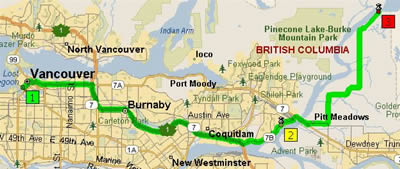

May 31, 2004
I took a guided fishing trip starting at Pitt Lake.

There is a 30-minute boat trip on Pitt Lake to reach the Upper Pitt River.

Pitt Lake has the distinction of being the largest tidal influenced lake in the world.

There is no vehicle access to Upper Pitt River. Black bears, eagles, and deer are common sights in the area.

The jet boats can navigate through water that is only 4" deep.

Close by is the small settlement of Alvin.

It has one of the oldest fish hatcheries in the province run by members of the Katzie band.

It was my first time catching a bull trout.

Bull Trout lives on clean, cold water and therefore is a prime indicator of the health of forest ecosystems and watersheds.

The Bull Trout are members of the North American salmon family, which includes salmon, trout, whitefish, char, and grayling.

They can live up to 12 years.

Unlike salmon, spawning adults survive to spawn again every two or three years.

Tue Upper Pitt River is a year-round catch-and-release zone.

The Pitt River summer runs sockeye stock is one of the largest found anywhere, with adults averaging ~3.5 kg (some individuals have been recorded over 7.0 kg).

Sockeye in this area spends an extra year feeding in the ocean and return as five or six-year-old fish rather than four as most other sockeye stocks.

The wild coho in the Upper Pitt River watershed is among the healthiest coho stocks in the province.

Here is where the legend of the Lost Mine of Pitt Lake originated. It started in 1889 when a First Nation named Slumach entered into a saloon and ordered a round of drinks for everyone present. He had a haversack packed with nuggets the size of walnuts. The police suspected that Slumach was murdering and then robbing prospectors for the gold. Other people believed he found a mine.

The Pitt River Hot Springs is the least visited Hot Springs in the Southwestern of BC. To get there, besides the 30 km up Pitt Lake, you need to add 22 km on an active logging road.

To get there, besides the 30 km up Pitt Lake, you need to add 22 km on an active logging road.

Pitt Lake has a unique race of longfin smelt and provides critical habitat for the White Sturgeon, currently listed as vulnerable on Canada's endangered species list.

The southern end of the lake is part of the Widgeon Valley Natural Wildlife Reserve, a nesting area for marsh birds.

This place has numerous wetland birds such as coots, bitterns, rails, loons, and ducks.

There are 105 species of passerines such as woodpeckers, finches, and jays and game birds such as ringneck pheasant, bandtail pigeon, and mourning dove.
